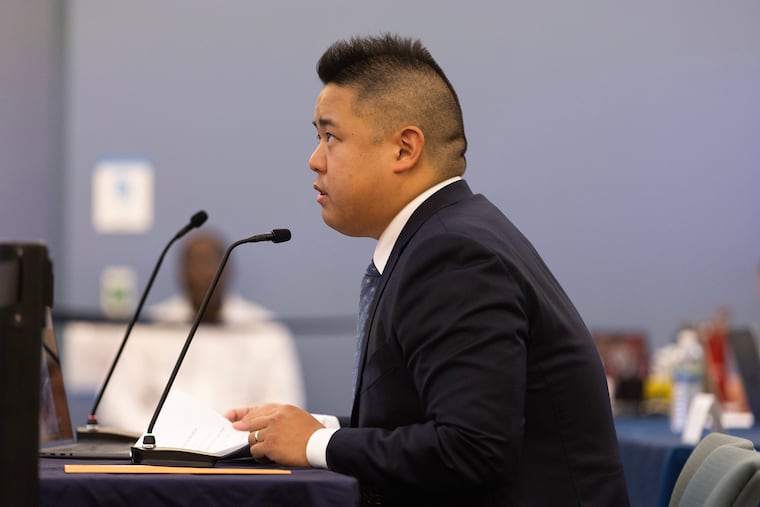Pa’s auditor general says Philly’s charter school office was fair to charters
Philadelphia's Charter Schools Office has come under fire from some advocates who say it has treated their schools unfairly. An audit found the office followed Pennsylvania's charter school law.

The Philadelphia School District’s Charter Schools Office — which has come under fire from some charter advocates who say that it opposes their schools and has discriminated against Black-led charters — followed a fair process when it evaluated applications to open new charters, the state’s auditor general said Tuesday.
Auditor General Timothy DeFoor said at a Harrisburg news conference announcing the audit findings that the office was also “consistent with the state law and guidance, as well as its own procedures,” while reviewing applications to renew charter schools—which are typically granted approval to operate for five-year terms—and monitoring charters’ performance. The audit reviewed applications submitted to the district in the 2021-22 and 2022-23 school years.
Still, DeFoor recommended some “improvements” for the charter office, including periodically reviewing the framework it uses to evaluate charter schools and more frequently auditing charter admission lotteries. That latter practice could have identified problems sooner at Franklin Towne Charter High School, DeFoor said.
The Inquirer reported last year that the Northeast Philadelphia charter had allegedly excluded students from numerous majority-non-white zip codes in its 2023 lottery; a review by the charter schools office found improprieties in prior years as well, and the school board voted to revoke its charter. A legal challenge is ongoing.
Peng Chao, chief of the charter office, said the office “understands the importance of being held accountable for establishing authorizing practices that are both compliant with applicable laws and implemented consistently.” He was pleased the audit found the office had “complied with all applicable legal requirements” and adhered to the standards in its charter evaluation framework.
“We look forward to engaging with the recommendations, not just internally, but also with our broader stakeholders across the city to determine the best path forward for our students and the sector,” Chao said in a statement.
Amy Hollister, director of community development at Philadelphia Charters for Excellence, an advocacy group representing most of the city’s charters, said the group concluded from the report that “the current charter framework needs reforming to improve charter authorizing, accountability, and equitable treatment for all schools.”
“Charter schools are public schools, open and accessible to all, and PCE looks forward to working with state leaders to enact common sense and overdue reforms to ensure that every Philadelphia public school student is able to attend a high-quality public school of their choice,” Hollister said in a statement.
Charter schools, which enroll about one-third of Philadelphia public school students, are publicly funded but independently run. The school board is charged with approving new charter schools, and deciding whether to renew existing ones.
Black-led charters pushback
The audit comes at a time when charter schools, particularly Black-led charters, have suggested the office does not deal fairly with them.
Some charter supporters recently campaigned heavily against the candidacy of Joyce Wilkerson, the former school board president, for the school board, whose members are appointed by the mayor. Wilkerson was seen as not friendly to charter schools.
Ultimately, City Council declined to confirm Wilkerson, but Mayor Cherelle L. Parker asked Wilkerson to serve until she names her replacement, which means that Wilkerson could serve indefinitely.
The African American Charter School Coalition said the audit didn’t appear to address concerns about disproportionate outcomes; most charters closed by the district over the past decade have been Black-led.
While the audit found the charter office followed policy and laws, “it is a well-known fact that often systemic bias is found in laws and policies that appear neutral on their face,” the group said in a statement.
The audit findings
The board has not approved any new charters since the 2017-18 school year. In the audit of seven applications for new charters submitted during the two school years reviewed, the auditor general’s office said it found that the charter office followed a comprehensive evaluation process, and that there were “no noticeable differences” between the charter applications and the evaluation reports presented by the office to the board.
The reports included review items required by Pennsylvania’s charter law, and “the evaluations appeared reasonable,” the audit said.
While the audit found the office followed state charter law in evaluating charter renewals — which consider academic, financial and organizational issues — it advised that the office seek input from an outside agency, like the National Association of Charter School Authorizers, to assess the standards and whether they’re equitable to all schools.
It also said the office should review charter lotteries more frequently — citing the Franklin Towne allegations and the need to “ensure a fair process.” Currently, those reviews are only conducted the year of a charter’s renewal, the audit said.
The audit looked at a sampling of existing schools that weren’t up for full renewals during the audit period, as well as a sampling of existing schools that were up for renewal. Among other information, it reviewed the office’s evaluation reports, as well as whether the charters were able to provide feedback before the reports were released.
The evaluations were in compliance with the charter law, the audit found, although it recommended that the office allow charters to provide an official response to the evaluations that could be included in the reports issued by the office to the school board. That would “increase transparency on issues included in these reports,” the audit said.